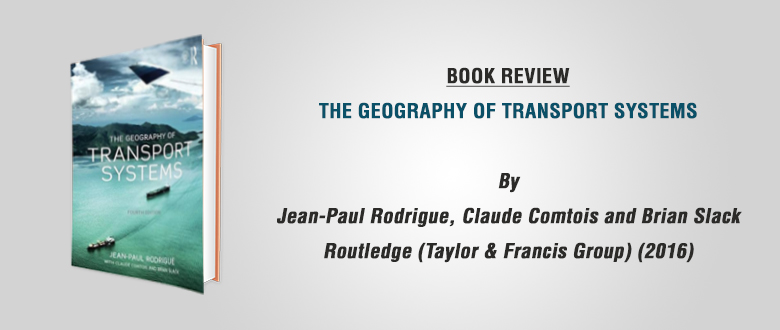Book Review
THE GEOGRAPHY OF TRANSPORT SYSTEMS
By
Jean-Paul Rodrigue, Claude Comtois and Brian Slack
Routledge (Taylor & Francis Group) (2016)
Mobility is fundamental to the socio-economic development of a geography. Transportation has become such an integral part of our daily lives that we as consumers are not able to clearly see transportation as a separate function. Various corporates are heavily dependent on efficient logistics to grab a comfortable portion of the market. Acknowledging this importance of transportation systems, the authors Jean-Paul Rodrigue, Claude Comtois and Brian Slack have worked on this book – The Geography of Transport Systems – to address various areas of concern that the managers and policy makers related to transportation face at present.
Divided into ten chapters, the book focusses on Transport Geography which is defined as a sub-discipline of geography concerned with movements of freight, people and information.
In the first part the authors present a new angle to look at transportations systems. They opine that transportation must be understood as having a spatial network structure and having close relation to commercial geography. In the next section, the authors talk about the necessity and the challenges related to various modes of transportation. The focus of this section is on inter-modal transportation which falls in line with the spatial network concept talked about in the first part. The chapters towards the end of the book describe the relation of transportation with economy, energy & environment and policy. The last chapter focuses on methods of analysisin transport geography.
The beauty of the book is that all the basic concepts of logistics and transportation viz. various modes, network models like hub and spoke, cross-dock, etc. have been covered. However, they have been presented and discussed in a non-traditional way, that links these concepts to the subject of transport geography. The authors mention that transportation is of no value unless it transforms the geographical attributes of freight, people or information, from an origin to destination, conferring on them an added value in the process.
According to authors, transportation plays a major role in international trade as well as at local urban level. It is associated with adding the maximum value in terms of time and location; whether it is passengers or goods that are being transported. The authors analyse urban logistics or city logistics using the concept of Urban Sprawl. This is defined as the spread of city buildings and houses into an area that was earlier a countryside or a less densely populated area.
A unique feature of the book is that it has a separate dedicated chapter on addressing the environmental concerns arising out of transportation. The authors mention that environmental impacts of transportation can be classified as direct, indirect and cumulative impacts. To understand the link between transportation and the environment, the managers must look at the main environmental dimensions of transportation – causes, activities, outputs and end-results of transport systems.
Transportation is a value-adding activity and to do so, it consumes energy just like any other commercial activity does. It accounts for 25 per cent of the world’s energy demand and 61.5 per cent of all the oil used each year. It is important therefore, that technological development in transportation must not only focus on economic and service level performance but also at minimizing fuel consumption and reducing the negative impact of transportation on the environment. This will help in making transportation truly sustainable.
The book clearly distinguishes policy from planning. Policy involves making strategies while planning involves implementation. The outcome of policy and planning is creation of suitable transportation infrastructure, by both public and private agencies. However, the challenge is that policies and plans are continuously changing as they address key changes in society and contemporary issues.
An essential feature of the book is the large number of case studies. Since the authors explain the concepts from new perspectives of transport-geography and sustainability, the inclusion of cases to demonstrate this was imperative and extremely useful. Each chapter has about three case studies incorporated.
This book is a suitable read by practicing managers and academicians who actively engage in research and consulting. However, it is not recommended as a text book for beginners or students in their management course, as to understand the perspectives present in the book, a basic and simple understanding of logistics and transportation is desired. It can definitely be picked up as a reference book.
Ms. Pragya Arya
Assistant Professor – Operations
IILM Institute of Higher Education
Lodhi Road, New Delhi



